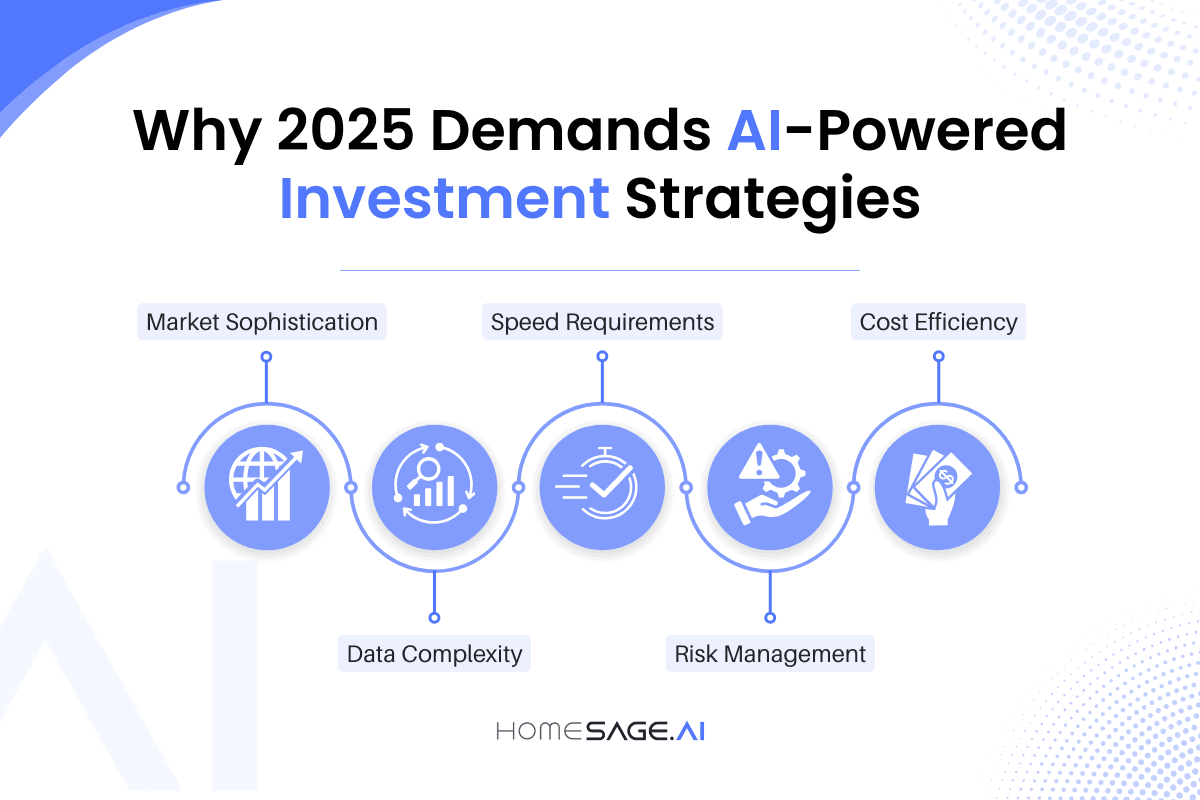Introduction
The landscape of real estate investing is undergoing a revolutionary transformation as we move deeper into 2025. For decades, successful property investment has required extensive market knowledge, countless hours of manual research, strong networking connections, and often a considerable amount of luck.
Today, artificial intelligence (AI) is fundamentally changing this paradigm, democratizing access to sophisticated investment analysis tools that were once exclusive to institutional investors and real estate professionals.
The modern real estate market presents both unprecedented opportunities and unique challenges. Rising interest rates, shifting demographics, evolving work patterns, and changing regulatory environments have created a complex investment landscape.
Simultaneously, technology platforms like Homesage.ai are emerging to help investors navigate these complexities with data-driven precision and artificial intelligence-powered insights.
This comprehensive guide explores the diverse world of investment properties, examines the traditional obstacles that have historically hindered individual investors, and demonstrates how AI technology—particularly through innovative platforms like Homesage.ai—is revolutionizing property investment strategies.
Whether you’re interested in fix-and-flip projects, building a portfolio of long-term rental properties, or maximizing returns through short-term vacation rentals like Airbnb, this guide provides actionable insights and real-world strategies for success in 2025 and beyond.
Understanding Investment Properties: A Complete Overview
Investment properties represent real estate assets acquired primarily for generating financial returns rather than personal occupancy.
These properties serve as vehicles for wealth creation through multiple income streams: rental income, property appreciation, tax benefits, and strategic resale opportunities. The investment property market encompasses various asset classes, each with distinct risk profiles, return potentials, and management requirements.
Comprehensive Types of Investment Properties
1. Long-Term Rental Properties
Long-term rental properties form the backbone of many real estate investment portfolios. These assets typically include single-family homes, duplexes, small apartment buildings, and condominium units leased to tenants for periods of one year or longer.
The appeal of long-term rentals lies in their potential to generate steady, predictable cash flow while building equity through mortgage principal paydown and property appreciation.
Key characteristics include:
- Stable monthly income through rent collection.
- Lower management intensity compared to short-term rentals.
- Potential for long-term appreciation in growing markets.
- Tax advantages including depreciation deductions.
- Opportunity to leverage financing for portfolio expansion
Successful long-term rental investing requires careful market selection, thorough tenant screening, and ongoing property maintenance to preserve both income streams and asset values.
2. Short-Term Vacation Rentals (Airbnb Strategy)
The short-term rental market has exploded over the past decade, driven by platforms like Airbnb, VRBO, and HomeAway. These properties cater to travelers, business professionals, and temporary residents seeking flexible accommodation options.
While potentially more lucrative than traditional rentals, short-term rentals demand significantly more active management and market awareness.
Strategic considerations include:
- Higher gross rental yields in desirable locations.
- Dynamic pricing opportunities based on seasonal demand.
- Enhanced property maintenance and guest experience requirements.
- Regulatory compliance challenges and local restriction risks.
- Market volatility influenced by tourism trends and economic conditions
Success in short-term rentals requires understanding local tourism patterns, mastering guest experience management, and staying current with evolving regulations that can dramatically impact profitability.
3. Fix-and-Flip Investment Strategy
Property flipping represents one of the most active forms of real estate investing, involving the acquisition of undervalued or distressed properties, strategic renovation or improvement, and rapid resale for profit.
This strategy appeals to investors seeking quicker returns and those with construction or renovation expertise.
Critical success factors include:
- Accurate assessment of acquisition costs and renovation budgets.
- Realistic timeline planning to minimize holding costs.
- Understanding local market preferences and buyer demographics.
- Managing contractor relationships and construction quality.
- Timing market conditions for optimal resale opportunities
Flipping requires substantial upfront capital, carries higher risk profiles, and demands active involvement throughout the investment cycle.
4. Commercial Investment Properties
Commercial real estate encompasses office buildings, retail spaces, warehouses, industrial facilities, and mixed-use developments.
These investments typically involve larger capital commitments but can provide substantial returns through longer-term lease agreements with business tenants.
Commercial property advantages include:
- Multi-year lease agreements providing income stability.
- Potential for higher absolute returns on larger investments.
- Professional tenant relationships and property management.
- Opportunities for value creation through strategic improvements.
- Portfolio diversification benefits beyond residential assets
However, commercial investing requires deeper market knowledge, more complex due diligence processes, and greater financial resources for acquisition and ongoing management.
5. Development and Mixed-Use Opportunities
Development projects and mixed-use properties represent the most sophisticated investment strategies, involving vacant land acquisition, new construction, or major redevelopment initiatives.
These projects can deliver exceptional returns but require extensive expertise, significant capital, and longer investment horizons.
Development considerations include:
- Zoning and permitting navigation.
- Construction financing and project management.
- Market timing for optimal project completion.
- Community impact and stakeholder management.
- Risk mitigation through phased development approaches.

Investment Property Comparison: Comprehensive Analysis
Property Type | Target Returns | Income Stability | Management Level | Capital Requirements | AI Analysis Benefits | Primary Risk Factors | Regulatory Considerations |
Long-Term Rental | 8-12% annually | High consistency | Low to Moderate | Moderate | Rent optimization, tenant screening, market analysis | Vacancy, tenant issues | Landlord-tenant laws |
Short-Term Rental | 12-20% annually | Variable/seasonal | High intensity | Moderate to High | Dynamic pricing, occupancy forecasting, regulation monitoring | Seasonality, regulation changes | Zoning, permits, taxes |
Fix-and-Flip | 15-30% per project | Project-based | Very High | High liquid capital | Cost estimation, ARV prediction, market timing | Budget overruns, market shifts | Building codes, permits |
Commercial Property | 6-15% annually | Moderate stability | High complexity | Very High | Lease analysis, market trends, demographic data | Economic cycles, tenant default | Complex zoning, ADA compliance |
Development Projects | 20-50% long-term | Low during development | Extremely High | Very High | Market analysis, timing, feasibility studies | Construction risks, approval delays | Extensive permitting, environmental |
Traditional Investment Property Search Challenges
Despite the wealth-building potential of real estate investment, finding and acquiring profitable properties has traditionally been fraught with obstacles that limit success for individual investors.
Understanding these challenges helps illustrate why AI-powered solutions are becoming essential tools for modern investors.
Information Asymmetry and Data Limitations
Traditional property search methods rely heavily on publicly available listing platforms that often provide incomplete or outdated information. Critical investment metrics like accurate rental comps, neighborhood trend analysis, renovation cost estimates, and regulatory compliance status are typically unavailable or require extensive manual research.
This information gap puts individual investors at a significant disadvantage compared to institutional buyers with access to proprietary data sources.
Time-Intensive Manual Analysis
Evaluating investment potential traditionally requires hours of spreadsheet work, phone calls to local contacts, and site visits to assess property conditions and neighborhood characteristics.
This manual process is not only time-consuming but also prone to errors and biases that can lead to poor investment decisions. Many promising opportunities are lost while investors struggle through lengthy analysis processes.
Market Competition and Speed Requirements
Today’s investment property market moves at unprecedented speed, with the best deals often receiving multiple offers within hours of listing. Traditional analysis methods simply cannot keep pace with market demands, causing investors to either miss opportunities entirely or make hasty decisions without proper due diligence.
Regulatory Complexity and Compliance Risks
Modern real estate investing involves navigating increasingly complex regulatory environments, particularly for short-term rentals where local ordinances can change rapidly.
Traditional research methods struggle to keep current with evolving regulations, creating compliance risks that can devastate investment returns.
The AI Revolution in Real Estate Investment
Artificial intelligence is fundamentally transforming real estate investment by providing sophisticated analytical capabilities, real-time market insights, and predictive modeling that were previously available only to institutional investors.
By 2025, AI has evolved from experimental technology to essential infrastructure for successful property investment.
Core AI Capabilities Transforming Investment Analysis
Machine Learning Algorithms: Advanced algorithms analyze vast datasets including historical sales, rental trends, demographic shifts, and economic indicators to predict property performance with remarkable accuracy. These systems continuously learn and improve their predictions based on new market data and outcomes.
Natural Language Processing: AI systems can analyze property descriptions, neighborhood reviews, local news, and regulatory documents to extract relevant investment insights that would require hours of manual research to uncover.
Computer Vision Technology: Automated property condition assessment through satellite imagery, street view analysis, and uploaded photos helps investors evaluate renovation needs and potential issues without physical inspections.
Predictive Analytics: Forward-looking models forecast rent growth, property appreciation, market cycles, and regulatory changes to help investors make proactive rather than reactive decisions.
Homesage.ai: Revolutionizing Investment Property Discovery
Homesage.ai represents the cutting edge of AI-powered real estate investment platforms, specifically designed to address the unique needs of property investors.
Unlike generic listing sites or basic analysis tools, Homesage.ai provides comprehensive investment intelligence that transforms how investors discover, evaluate, and acquire properties.
Advanced Platform Features and Capabilities
Intelligent Property Screening: Homesage.ai‘s algorithms automatically scan thousands of active listings daily, applying sophisticated calculations to identify properties matching specific investment criteria.
This automated screening process can evaluate more properties in minutes than traditional methods could analyze in days.
Dynamic Investment Analysis: Each property receives comprehensive analysis, including cash flow projections, cap rate calculations, appreciation forecasts, and comparative market analysis.
The platform adjusts these calculations in real-time based on changing market conditions and user-specified assumptions.
Multi-Strategy Comparison: For every property, investors can instantly compare potential returns across different strategies—long-term rental, short-term rental, or fix-and-flip—enabling optimal strategy selection based on market conditions and personal preferences.
Neighborhood Intelligence: Beyond basic demographics, the platform provides deep neighborhood insights including school quality ratings, crime trends, walkability scores, transportation access, and planned development projects that could impact future property values.
Explore these capabilities in detail at the investment property analysis tools section.
Key Advantages of AI-Powered Property Investment Tools
- Massive Scale Analysis: Process thousands of properties simultaneously across multiple markets and listing platforms.
- Real-Time Market Intelligence: Access continuously updated market data, pricing trends, and regulatory changes.
- Customized Investment Criteria: Set precise parameters for location, return targets, property types, and risk tolerance.
- Automated Due Diligence: Generate comprehensive property reports including renovation estimates, rental projections, and compliance assessments.
- Competitive Advantage: Identify undervalued properties and emerging market opportunities before competitors.
- Risk Mitigation: Early warning systems for regulatory changes, market downturns, and property-specific issues.
- Portfolio Optimization: Analyze existing holdings and identify strategic acquisition opportunities for balanced growth.
- Time Efficiency: Reduce research time from weeks to hours while improving analysis accuracy and depth.
Platform Comparison: AI Investment Tools
Platform | Primary Focus | Key Strengths | Market Coverage | User Type |
Homesage.ai | Complete investment analysis | Multi-strategy analysis, real-time data | US residential | All investor levels |
Listings, AVM | Data depth | US residential | All investor levels | |
Risk assessment | Data depth, institutional tools | US comprehensive | Professional/enterprise | |
Market research | Industry insights, trend analysis | Global markets | Institutional |
Detailed Investment Strategy Analysis with AI Support
Fix-and-Flip Properties: Maximizing Renovation Returns
Fix-and-flip investing success depends critically on accurate cost estimation, realistic timeline planning, and precise after-repair value (ARV) predictions. Homesage.ai transforms flip investing through:
Acquisition Intelligence: AI algorithms identify distressed properties, motivated sellers, and below-market opportunities by analyzing listing patterns, price reductions, and property condition indicators. The system flags properties with high equity potential before they become widely known.
Renovation Cost Modeling: Advanced algorithms estimate renovation costs based on local contractor rates, material costs, and property-specific requirements. These estimates account for regional variations, seasonal pricing fluctuations, and project complexity factors.
ARV Prediction Accuracy: Machine learning models analyze recent comparable sales based on property condition and numerous other property attributes, market trends, and renovation impact data to predict post-renovation values with remarkable precision.
This analysis helps investors avoid over-improvement while maximizing return potential.
Timeline and Holding Cost Analysis: Predictive models estimate optimal renovation timelines, holding costs, and market timing to maximize net profits while minimizing risk exposure.
Visit Homesage.ai’s equity analysis tools to see these features in action.
Long-Term Rental Investment: Building Sustainable Cash Flow
Long-term rental success requires careful market selection, accurate income projections, and thorough risk assessment. AI enhances every aspect of rental property analysis:
Rental Income Optimization: Advanced algorithms analyze local rental markets, seasonal patterns, and demographic trends to predict optimal rental rates. The system accounts for property-specific features, neighborhood amenities, and competitive positioning.
Expense Prediction and Budgeting: Comprehensive expense modeling includes property taxes, insurance, maintenance reserves, property management fees, and vacancy allowances based on local market conditions and property characteristics.
Tenant Demand Analysis: AI evaluates local employment trends, population growth, school quality, and transportation access to assess long-term rental demand stability.
Market Cycle Awareness: Predictive models identify optimal acquisition timing based on market cycles, interest rate trends, and local economic indicators.
Short-Term Rental Strategy: Maximizing Airbnb Returns
Short-term rental investing presents unique opportunities and challenges that AI technology addresses through sophisticated market analysis:
Dynamic Pricing Intelligence: AI algorithms analyze local event calendars, seasonal patterns, competitive pricing, and demand fluctuations to optimize nightly rates throughout the year. This dynamic approach can significantly increase gross rental income compared to static pricing strategies.
Occupancy Rate Prediction: Machine learning models forecast occupancy rates based on location attractiveness, property features, seasonality, and local tourism trends. These predictions help investors evaluate realistic income potential.
Regulatory Compliance Monitoring: Automated tracking of local ordinances, zoning restrictions, and permit requirements helps investors avoid compliance issues that could shut down operations or result in significant penalties.
Guest Experience Optimization: AI analysis of guest reviews, competitor amenities, and market preferences helps investors make strategic property improvements that enhance guest satisfaction and booking rates.
Why 2025 Demands AI-Powered Investment Strategies
- Market Sophistication: Institutional investors extensively use AI, creating competitive disadvantages for traditional individual investors.
- Data Complexity: Modern markets generate massive data streams that human analysis cannot effectively process.
- Speed Requirements: Best investment opportunities require rapid analysis and decision-making capabilities.
- Regulatory Dynamics: Changing regulations, especially for short-term rentals, demand real-time compliance monitoring.
- Risk Management: AI provides early warning systems for market shifts, regulatory changes, and property-specific issues.
- Portfolio Optimization: Advanced analytics enable strategic portfolio building rather than random property accumulation.
- Cost Efficiency: AI reduces research costs while improving analysis quality and investment outcomes.

Access comprehensive AI tools at Homesage.ai’s product suite.
External Resources for Advanced Investment Education
- Money.com – Best Places to Invest in Real Estate 2025: Comprehensive market analysis and city-specific investment opportunities.
- PwC Emerging Trends in Real Estate: Professional industry insights and institutional investment trends.
Conclusion
The convergence of artificial intelligence and real estate investment represents a paradigm shift that will define successful investing strategies throughout 2025 and beyond.
Traditional methods of property analysis, market research, and investment decision-making are rapidly becoming obsolete in favor of data-driven, AI-powered approaches that provide superior accuracy, speed, and insight.
Platforms like Homesage.ai are democratizing access to sophisticated investment analysis tools, enabling individual investors to compete effectively with institutional buyers while making more informed decisions across all property investment strategies. Whether pursuing fix-and-flip opportunities, building long-term rental portfolios, or maximizing short-term rental returns through platforms like Airbnb, AI technology provides the competitive advantages necessary for sustained success.
The investors who thrive in 2025’s competitive market will be those who embrace these technological advances, integrate AI tools into their decision-making processes, and maintain adaptability as technology continues evolving.
The future of real estate investment belongs to those who combine human insight with artificial intelligence capabilities, creating a powerful synergy that maximizes returns while minimizing risks in an increasingly complex and competitive marketplace.
People Also Ask:
Q: How does AI help you find profitable investment properties?
A: AI revolutionizes property investment by automating complex analysis processes that traditionally required weeks of manual research. Advanced algorithms simultaneously evaluate thousands of properties across multiple criteria including cash flow potential, appreciation forecasts, renovation opportunities, and market trends.
AI systems like Homesage.ai process vast datasets including MLS listings, rental comps, demographic trends, and regulatory information to identify properties with optimal risk-adjusted returns.
This technology enables investors to act quickly on opportunities while making data-driven decisions rather than relying on intuition or limited manual research.
Q: Are AI real estate predictions reliable for Airbnb and short-term rentals?
A: Modern AI platforms demonstrate remarkable accuracy in short-term rental predictions by analyzing comprehensive datasets including historical occupancy rates, seasonal demand patterns, local event calendars, competitive pricing, and regulatory environments.
These systems continuously learn from actual booking data, guest preferences, and market changes to refine their predictions. However, accuracy depends on data quality and local market conditions.
Leading platforms like Homesage.ai incorporate real-time market feedback and regulatory monitoring to provide reliable forecasts that significantly outperform traditional estimation methods.
Q: What are the best AI platforms for investment property research in 2025?
A: The optimal platform depends on investment strategy and experience level. Homesage.ai excels in comprehensive multi-strategy analysis, offering integrated tools for flips, long-term rentals, and short-term rentals with real-time market data and regulatory monitoring.
Redfin provides sophisticated valuation models and market forecasting capabilities.
CoreLogic offers enterprise-level analytics and risk assessment tools primarily for institutional investors.
For beginners, Homesage.ai provides the most accessible entry point with comprehensive educational resources and user-friendly interfaces, while experienced investors may benefit from multiple platform approaches depending on their specific needs and investment focus areas.





